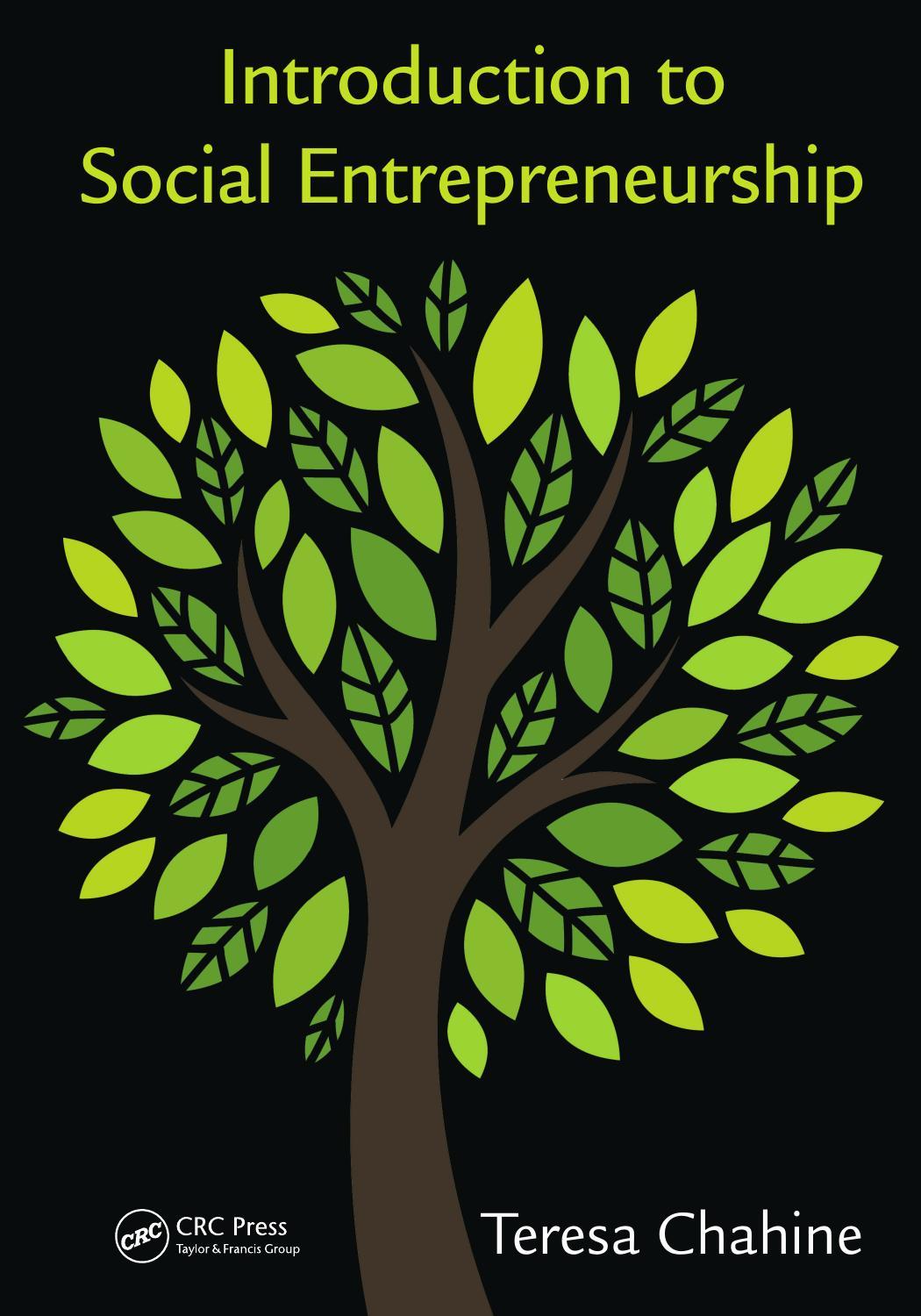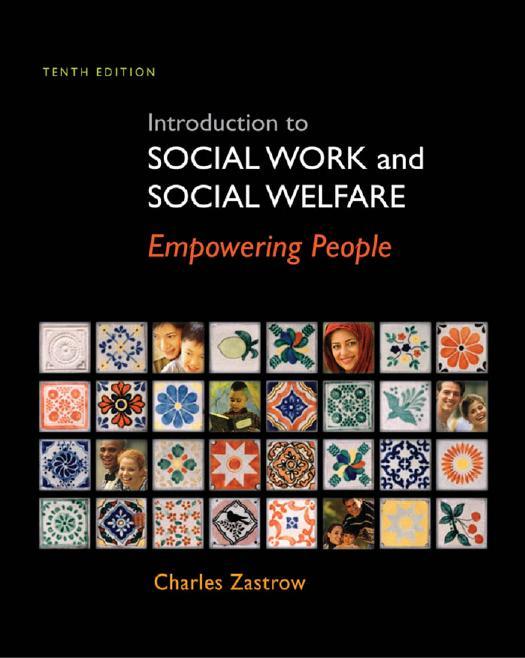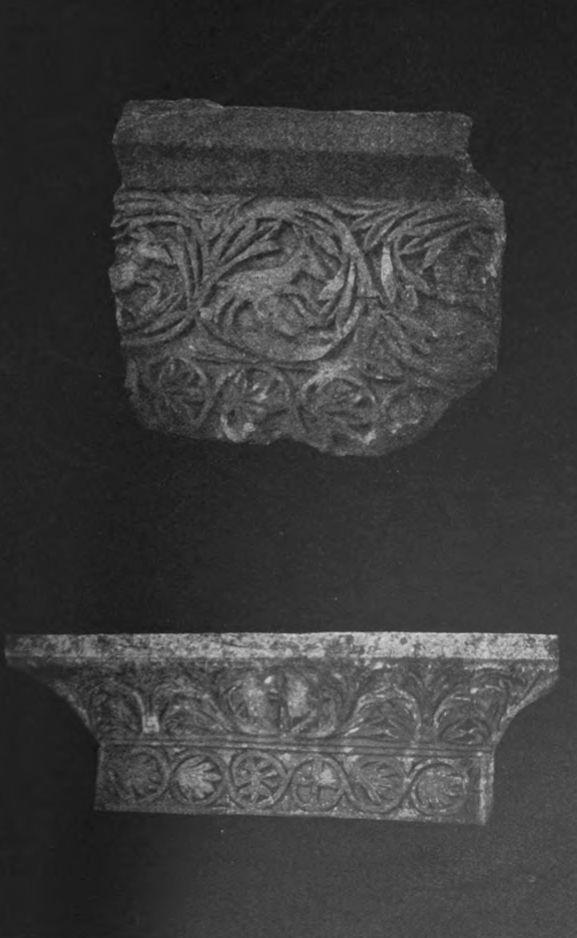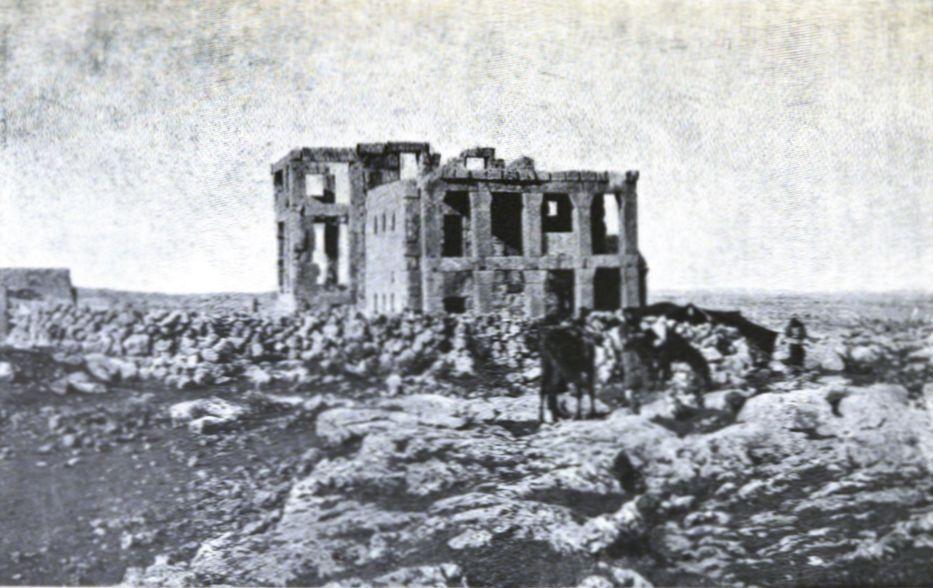Random
documents with unrelated content Scribd suggests to you:
protagonists is in the right, but an inherent probability that all are in the wrong. The Smātiyyeh had stolen some of the Seijari cattle, the sons of Aḥmed had gone down into the village and killed two of the Arabs—in the castle it was said that the Arabs had attacked them and that they had killed them in self-defence—the Government, always jealous of the semi-independence of ruling sheikhs, had seized the opportunity to strike down the Seijari whether they were at fault or no; soldiers had been sent from Ḥamāh, one of Aḥmed's sons had been put to death, two more were in prison, and all the cattle had been carried off. The rest of the Seijaris were ordered not to stir from the castle, nor indeed could they do so, for the Smātiyyeh were at their gates ready and anxious to kill them if they stepped beyond the walls. They appealed to Ḥamāh for protection, and a guard of some ten soldiers was posted by the river, whether to preserve the lives of the sheikhs or to keep them the more closely imprisoned it was difficult to make out. These events dated from two years back, and for that time the Seijaris had remained prisoners at Ḥamāh and in their own castle, and had been unable to superintend the cultivation of their fields, which were running in consequence to rack and ruin. Moreover, there seemed to be no prospect of improvement in the situation. Later in the afternoon a messenger arrived saying that Aḥmed's brother, 'Abd ul Ḳādir, would be pleased to receive me and would have come himself to welcome me if he could have left the castle. I went up without Maḥmūd and heard the whole story again from the point of view of the sheikhs, which helped me to no conclusion, since it was in most essentials a different story from that which I had heard from Maḥmūd. The only indisputable point (and it was probably not so irrelevant as it seems) was that the Seijari women were wonderfully beautiful. They wore dark blue Bedouin dress, but the blue cloths hanging from their heads were fastened with heavy gold ornaments, like the plaques of the Mycenæan treasure, one behind either temple. Agreeable though their company proved to be I was obliged to cut my visit short by reason of the number of fleas that shared the captivity of the family. Two of the younger women walked down with me through the ruins of the castle, but when we reached the great outer gate they stopped and looked at me standing on the threshold.
"Allah!" said one, "you go forth to travel through the whole world, and we have never been to Ḥamāh!"
I saw them in the gateway when I turned again to wave them a farewell. Tall and straight they were, and full of supple grace, clothed in narrow blue robes, their brows bound with gold, their eyes following the road they might not tread. For whatever may happen to the sheikhs, nothing is more certain than that women as lovely as those two will remain imprisoned by their lords in Ḳal'at es Seijar.
We rode next day by cultivated plains to Ḳal'at el Mudīk, a short stage of under four hours. Although there were several traces of ruined towns—one in particular
I remember at a hamlet called Sheikh Ḥadīd, where there was a mound that looked as if it might have been an acropolis—the journey would have been uninteresting but for Maḥmūd's stories. His talk ran through the characteristics of the many races that make up the Turkish empire, with most of which he was familiar, and when he came to the Circassians it appeared that he shared my aversion to them.
"Oh lady," said he, "they do not know what it is to make return for kindness. The father sells his children, and the children would kill their own father if he had gold in his belt. It happened once that I was riding from Tripoli to Ḥomṣ, and near the khān—you know the place—I met a Circassian walking alone. I said: 'Peace be upon you! Why do you walk?' for the Circassians never go afoot. He said: 'My horse has been stolen from me, and I walk in fear upon this road.' I said: 'Come with me and you shall go in safety to Ḥomṣ.' But I made him walk before my horse, for he was armed with a sword, and who knows what a Circassian will do if you cannot watch him? And after a little we passed an old man working in the fields, and the Circassian ran out to him and spoke with him, and drew his sword as though to kill him. And I called out: 'What has this old man done to you?' And he replied: 'By God! I am hungry, and I asked him for food, and he said "I have none!" wherefore I shall kill him.' Then I said: 'Let him be. I will give you food.' And I gave him the half of all I had, bread and sweetmeats and oranges. So we journeyed until we came to a stream, and I was thirsty, and I got off my mare and holding her by the bridle I stooped to drink. And I looked up suddenly and saw the Circassian with his foot in my stirrup on the other side of the mare, for he designed to mount her and ride away. And, by God! I had been a father and a mother to him, therefore I struck him with my sword so that he fell to the ground. And I bound him and drove him to Ḥomṣ and delivered him to the Government. This is the manner of the Circassians, may God curse them!"
I asked him of the road to Mecca and of the hardships that the pilgrims endure upon the way.
"By the Face of God! they suffer," said he. "Ten marches from Ma'ān to Medā'in Ṣāleḥ, ten from there to Medīna, and ten from Medīna to Mecca, and the last ten are the worst, for the Sherif of Mecca and the Arab tribes plot together, and the Arabs rob the pilgrims and share the booty with the Sherif. Nor are the marches like the marches of gentlefolk when they travel, for sometimes there are fifteen hours between water and water, and sometimes twenty, and the last march into Mecca is thirty hours. Now the Government pays the tribes to let the pilgrims through in peace, and when they know that the Ḥājj is approaching they assemble upon the hills beside the road and cry out to the Amīr ul Ḥājj: 'Give us our dues, 'Abd ur Raḥmān Pasha!' And to each man he gives according to his rights, to one money, and to another a pipe and tobacco, to a third a kerchief, and to a fourth a cloak. Yet it is not the pilgrims that suffer most, but those who
keep the forts that guard the water tanks along the road, and every fort is like a prison. It happened once that I was sent with the military escort, and my horse fell sick and could not move, and they left me at one of the forts between Medā'in Ṣāleḥ and Medina till they should return. Six weeks or more I lived with the keeper of the fort, and we saw no one, and we eat and slept in the sun, and eat again, and slept, for we could not ride out for fear of the Ḥoweiṭāṭ and the Beni 'Atiyyeh who were at war together. And the man had lived there ten years and never gone a quarter of an hour from that spot, for he watched over the stores that feed the Ḥājj when it passes. By the Prophet of God!" said Maḥmūd, with a sweeping gesture of the hand from earth to sky, "for ten years he had seen nothing but the earth and God! Now he had a little son, and the boy was deaf and dumb, but his eyes saw further than any man's, and he watched all day from the top of the tower. And one day he came running to his father and pointed with his hands, and the father knew he had seen a raiding party far off, and we hastened within and shut the doors. And the horsemen drew near, five hundred of the Beni 'Atiyyeh, and they watered their mares and demanded food, and we threw down bread to them, for we dared not open the doors. And while they eat there came across the plain the raiders of the Ḥoweiṭāṭ, and they began to fight together by the castle wall, and they fought until the evening prayer, and those who lived rode away, leaving their dead to the number of thirty. And we remained all night with locked doors, and at dawn we went down and buried the dead. But it is better to live in a fortress by the Ḥājj road," he continued, "than to serve as a soldier in Yemen, for there the soldiers receive no pay and of food not enough on which to live, and the sun bums like a fire. In Yemen if a man stood in the shade and saw a purse of gold lying in the sun, by God! he would not go out to pick it up, for the heat is like the fire of hell. Oh lady, is it true that in Egypt the soldiers get their pay week by week and month by month?"
I replied that I believed it to be the case, such being the custom in the English army.
"As for us," said Maḥmūd, "our pay is always due to us for half a year, and often out of twelve months' pay we receive but six months'. Wāllah! I have never touched more than eight months' pay for a complete year. Once," he added, "I was in Alexandria—Māsha'llah, the fine city! Houses it has as big as the palaces of kings, and all the roads have paved edges whereon the people walk. And there I saw a cabman who sued a lady for his fare, and the judge gave it to him. By the Truth! the ways of judges are different with us," observed Maḥmūd thoughtfully; and then, with an abrupt transition, he exclaimed: "Look, oh lady! there is Abu Sa'ad."
I looked, and saw Abu Sa'ad walking in the ploughed field, with his white coat as spotless as though he had not just alighted from a journey as long as one of Maḥmūd's, and his black sleeves folded neatly against his sides, and I made
haste to welcome the Father of Good Luck, for in Syria the first stork is like the first swallow with us. He cannot, however, any more than the swallow make summer, and we rode that day into Ḳal'at el Mudīk, in drenching rain.
A CAPITAL, ḤAMĀH
Ḳal'at el Mudīk is the Apamea of the Seleucids. It was founded by Seleucus Nicator, that great town builder who had so many cities for his god-daughters: Seleucia in Pieria, Seleucia on the Calycadnus, Seleucia in Babylonia, and more besides. Though it has been utterly destroyed by earthquakes, enough remains in ruin to prove its ancient splendour, the wide circuit of its walls, the number of its temples and the magnificence of its columned streets. You can trace the main thoroughfares from gate to gate by the heaped masses of the colonnades, and mark the stone bases of statues at the intersections of the ways. Here and there a massive portal opens into vacuity, the palace which it served having been razed to the ground, or an armed horseman decorates the funeral stele on which the living merits of his prototype are recorded. The Christians took up the story where the Seleucid kings had left it, and the ruins of a great church with a courtyard set round with columns lie on the edge of the main street. As I plunged in the soft spring rain through deep grass and flowers and clumps of asphodel, to the discomfiture of the grey owls that sat blinking on the heaps of stones, the history and architecture of the town seemed an epitome of the marvellous fusion between Greece and Asia that came of Alexander's conquests. Here was a Greek king whose capital lay on the Tigris, founding a city on the Orontes and calling it after his Persian wife—what builders raised the colonnades that adorned this and all the Greek-tinged towns of Syria with classic forms used in a spirit of Oriental lavishness? what citizens walked between them, holding out hands to Athens and to Babylon?
The only inhabited part of Ḳal'at el Mudīk is the castle itself, which stands on the site of the Seleucid acropolis, a hill overlooking the Orontes valley and the Noṣairiyyeh mountains. It is mainly of Arab workmanship, though many hands have taken part in its construction, and Greek and Arabic inscriptions are built
pellmell into the walls. To the south of the castle there is a bit of classical building of which I have seen no explanation. It looks as if it might be part of the proscenium of the theatre, for the rising ground behind it is scooped away in the shape of an auditorium. A very little digging would be enough to show whether traces of seats lie under the grassy bank. In the valley there is a ruined mosque and a fine khān, half ruined also. The Sheikh of the castle gave me coffee, and told me yet another version of the Seijari story, irreconcilable with either of the two first, whereat I congratulated myself on having early determined not to attempt to resolve that tangled problem. From the castle top the valley of the Orontes seemed to be all under water: it was the great swamp of the 'Asī, said the Sheikh, which dries in summer when the island villages (as I saw them now) resume their places as parts of the plain. Yes, certainly they were very unhealthy, summer and winter they were fever-stricken, and most of the inhabitants died young—lo, we belong to God and unto Him do we return! In winter and spring these short-lived folk follow the calling of fishermen, but when the swamp dried they turn into husbandmen after a fashion of their own. They cut the reeds and sowed maize upon them, and set them alight, and the maize rose out of the ashes and grew—a phœnix-like method of agriculture.
At Apamea the excellent cakes I had bought in Damascus came to an end—it seemed a serious matter at the time when the bill of fare was apt to be monotonous. Lunch was the least palatable of all our meals. Hard-boiled eggs and chunks of cold meat cease to tempt the appetite after they have been indulged in for a month or two. Gradually I taught Mikhāil to vary our diet with all the resources the country offered, olives and sheep's milk cheese, salted pistachios, sugared apricots and half a dozen other delicacies, including the Damascus cakes. The native servant, accustomed to feeding Cook's tourists on sardines and tinned beef, thinks it beneath the dignity of a European to eat such food, and you must go hunt the bazaars with him yourself and teach him what to buy, or you may pass through the richest country and starve on cold mutton.
[9]It will be the terminus only for a month or two longer for the line has at length been continued to Aleppo.
[10]The plural of Ismaili in the vernacular is Samawīleh. I do not know whether this is the literary form, but it is the one I have always heard.
CHAPTER
XI
The next day's journey is branded on my mind by an incident which I can scarcely dignify with the name of an adventure—a misadventure let me call it. It was as tedious while it was happening as a real adventure (and no one but he who has been through them knows how tiresome they frequently are), and it has not left behind it that remembered spice of possible danger that enlivens fireside recollections. We left Ḳal'at el Mudīk at eight in pouring rain, and headed northwards to the Jebel Zāwiyyeh, a cluster of low hills that lies between the Orontes valley and the broad plain of Aleppo. This range contains a number of ruined towns, dating mainly from the fifth and sixth centuries, partially reinhabited by Syrian fellaḥīn, and described in detail by de Vogüé and Butler. The rain stopped as we rode up a low sweep of the hills where the red earth was all under the plough and the villages set in olive groves. The country had a wide bare beauty of its own, which was heightened by the dead towns that were strewn thickly over it. At first the ruins were little more than heaps of cut stones, but at Kefr Anbīl there were some good houses, a church, a tower and a very large necropolis of rock-cut tombs. Here the landscape changed, the cultivated land shrank into tiny patches, the red earth disappeared and was replaced by barren stretches of rock, from out of which rose the grey ruins like so many colossal boulders. There must have been more cultivation when the district supported the very large population represented by the ruined towns, but the rains of many winters have broken the artificial terracings and washed the earth down into the valleys, so that by no possibility could the former inhabitants draw from it now sufficient produce to sustain them. North-east of Kefr Anbīl, across a labyrinth of rocks, appeared the walls of a wonderful village, Khīrbet Ḥass, which I was particularly anxious to see. I sent the mules straight to El Bārah, our halting place that night, engaged a villager as a guide over the stony waste, and set off with Mikhāil and Maḥmūd. The path wound in and out between the rocks, a narrow band of grass plentifully scattered with stones; the afternoon sun shone hot upon us, and I dismounted, took off my coat, bound it (as I thought) fast to my saddle, and walked on ahead amid the grass and flowers. That was the beginning of the misadventure. Khīrbet Ḥass was quite deserted save for a couple of black tents. The streets of the market were empty, the walls of the shops had fallen in, the church had long been abandoned of worshippers, the splendid houses were as silent as the tombs, the palisaded gardens were untended, and no one came down to draw water from the deep cisterns. The charm and the mystery of it kept me loitering till the sun was near the horizon and a cold wind had risen to remind me of my coat, but, lo! when I returned to the horses it was gone from my saddle. Tweed coats do not grow on every bush in north Syria, and it was obvious that some effort must be made to recover mine. Maḥmūd rode back almost to Kefr Anbīl, and returned after an hour and a half empty handed. By this time it was growing dark; moreover a black storm was blowing up from the east, and we had an hour to ride through very rough
country. We started at once, Mikhāil, Maḥmūd and I, picking our way along an almost invisible path. As ill luck would have it, just as the dusk closed in the storm broke upon us, the night turned pitch dark, and with the driving rain in our faces we missed that Medea-thread of a road. At this moment Mikhāil's ears were assailed by the barking of imaginary dogs, and we turned our horses' heads towards the point from which he supposed it to come. This was the second stage of the misadventure, and I at least ought to have remembered that Mikhāil was always the worst guide, even when he knew the direction of the place towards which he was going. We stumbled on; a watery moon came out to show us that our way led nowhere, and being assured of this we stopped and fired off a couple of pistol shots, thinking that if the village were close at hand the muleteers would hear us and make some answering signal. None came, however, and we found our way back to the point where the rain had blinded us, only to be deluded again by that phantom barking and to set off again on our wild dog chase. This time we went still further afield, and Heaven knows where we should ultimately have arrived if I had not demonstrated by the misty moon that we were riding steadily south, whereas El Bārah lay to the north. At this we turned heavily in our tracks, and when we had ridden some way back we dismounted and sat down upon a ruined wall to discuss the advisability of lodging for the night in an empty tomb, and to eat a mouthful of bread and cheese out of Mahmūd's saddle-bags. The hungry horses came nosing up to us; mine had half my share of bread, for after all he was doing more than half the share of work. The food gave us enterprise; we rode on and found ourselves in the twinkling of an eye at the original branching off place. From it we struck a third path, and in five minutes came to the village of El Bārah, round which we had been circling for three hours. The muleteers were fast asleep in the tents; we woke them somewhat rudely, and asked whether they had not heard our signals. Oh yes, they replied cheerfully, but concluding that it was a robber taking advantage of the stormy night to kill some one, they had paid small attention. This is the whole tale of the misadventure; it does credit to none of the persons concerned, and I blush to relate it. It has, however, taught me not to doubt the truth of similar occurrences in the lives of other travellers whom I have now every reason to believe entirely veracious.
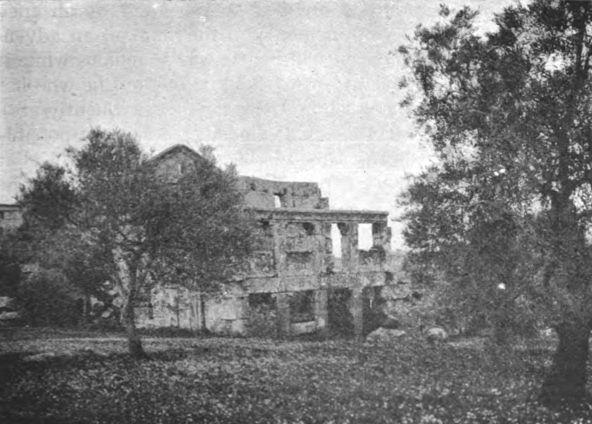
A HOUSE AT EL BĀRAH
MOULDING AT EL BĀRAH AND LINTEL AT KHIRBET HĀSS
Intolerable though El Bārah may be by night, by day it is most marvellous and most beautiful. It is like the dream city which children create for themselves to dwell in between bedtime and sleep-time, building palace after palace down the shining ways of the imagination, and no words can give the charm of it nor the magic of the Syrian spring. The generations of the dead walk with you down the streets, you see them flitting across their balconies, gazing out of windows wreathed with white clematis, wandering in palisaded gardens that are still planted with olive and with vine and carpeted with iris, hyacinth and anemone. Yet you may search the chronicles for them in vain; they played no part in history, but were content to live in peace and to build themselves great houses in which to dwell and fine tombs to lie in after they were dead. That they became Christian the hundreds of ruined churches and the cross carved over the doors and windows of their dwellings, would be enough to show; that they were artists their decorations prove; that they were wealthy their spacious mansions their summer houses and stables and out-houses testify. They borrowed from Greece such measure of cultivation and of the arts as they required, find fused with them the spirit of Oriental magnificence which never breathed; without effect on the imagination of the West; they lived in comfort and security such as few of their contemporaries can have known, and the Mahommadan invasion swept them off the face of the earth.
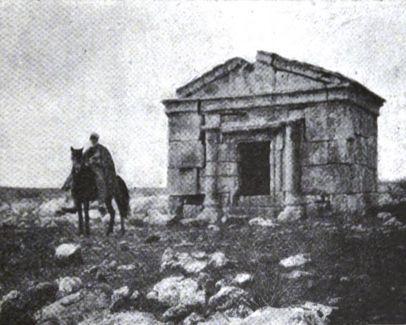
TOMB, SERJILLA
I spent two days at El Bārah and visited five or six of the villages round about, the Sheikh of El Bārah and his son serving me as guides. The Sheikh was a sprightly old man called Yūnis, who had guided all the distinguished
archæologists of his day, remembered them, and spoke of them by name—or rather by names of his own, very far removed from the originals. I contrived to make out those of de Vogüé and Waddington, and another that was quite unintelligible was probably intended for Sachau. At Serjilla, a town with a sober and solid air of respectability that would be hard to match, though it is roofless and quite deserted, he presented me with a palace and its adjacent tomb that I might live and die in his neighbourhood, and when I left he rode with me as far as Deir Sanbīl to put me on my way. He was much exercised that day by a disturbance that had arisen in a village near at hand. A man had been waylaid by two others of a neighbouring village who desired to rob him. Fortunately a fellow townsman had come to his assistance and together they had succeeded in beating off the attack, but in the contest the friend had lost his life. His relations had raided the robbers' village and carried off all the cattle. Maḥmūd was of opinion that they should not have taken the law into their own hands.
"By God!" said he, "they should have laid the case before the Government."
But Yūnis replied, with unanswerable logic:
"Of what use was it to go to the Government? They wanted their rights."
In the course of conversation I asked Yūnis whether he ever went to Aleppo.
"By God!" said he. "And then I sit in the bazaars and watch the consuls walking, each with a man in front clothed in a coat worth two hundred piastres, and the ladies with as it were flowers upon their heads." (The fashionable European hat, I imagine.) "I always go to Aleppo when my sons are in prison there," he explained. "Sometimes the gaoler is softhearted and a little money will get them out."
SHEIKH YŪNIS
I edged away from what seemed to be delicate ground by asking how many sons he had.
"Eight, praise be to God! Each of my wives bore me four sons and two daughters."
"Praise be to God!" said I.
"May God prolong your life!" said Yūnis. "My second wife cost me a great deal of money," he added.
"Yes?" said I.
"May God make it Yes upon you, oh lady! I took her from her husband, and by God (may His name be praised and exalted!) I had to pay two thousand piastres to the husband and three thousand to the judge."
HOUSE AT SERJILLA
This was too much for Ḥājj Maḥmūd's sense of the proprieties.
"You took her from her husband?" said he. "Wāllah! that was the deed of a Noṣairi or an Ismaili. Does a Moslem take away a man's wife? It is forbidden."
"He was my enemy," explained Yūnis. "By God and the Prophet of God, there was enmity between us even unto death."
"Had she children?" inquired Maḥmūd.
"Ey wāllah!" assented the Sheikh, a little put about by Maḥmūd's disapproval. "But I paid two thousand piastres to the husband and three thousand——"
"By the Face of God!" exclaimed Maḥmūd, still more outraged, "it was the deed of an infidel."
And here I put an end to further discussion of the merits of the case by asking whether the woman had liked being carried off.
"Without doubt," said Yūnis. "It was her wish."
We may conclude, therefore, that ethics did not have much to do with the matter, though he indemnified so amply both the husband and the judge. This episode led us to discuss the usual price paid for a wife.
TOMB OF BIZZOS
"For such as we," said Yūnis, with an indescribable air of social pre-eminence, "the girl will not be less than four thousand piastres, but a poor man who has no money will give the father a cow or a few sheep, and he will be content."
After he left us I rode round by Ruweiḥā that I might see the famous church by which stands the domed tomb of Bizzos. This church is the most beautiful in the Jebel Zāwiyyeh, with its splendid narthex and carved doorways, its stilted arches and the wide-spanned arcades of its nave—how just was the confidence in his own mastery over his material which encouraged the builder to throw those great arches from pier to pier is proved by the fact that one of them stands to this day. The little tomb of Bizzos is almost as perfect as it was when it was first built. By the doorway an inscription is cut in Greek: "Bizzos son of Pardos. I lived well, I die well and well I rest. Pray for me." The strangest features in all the architecture of North Syria are the half-remembered classical motives that find their way into mouldings that are almost Gothic in their freedom, and the themes of a classical entablature that grace church window or architrave. The scheme of Syrian decoration was primarily a row of circles or wreaths filled with whorls or with the Christian monogram; but as the stone-cutters grew more skilful they ran their circles together into a hundred exquisite and fanciful shapes of acanthus and palm and laurel, making a flowing pattern round church or tomb as varied as the imagination could contrive. The grass beneath their feet, the leaves on the
boughs above their heads, inspired them with a wealth of decorative design much as they inspired William Morris twelve hundred years later.
There is another church at Ruweiḥā scarcely less perfect than the Bizzos church, but not so splendid in design. It is remarkable for a monument standing close to the south wall, which has been explained as a bell tower, or a tomb, or a pulpit, or not explained at all. It is constructed of two stories, the lower one consisting of six columns supporting a platform, from the low wall of which rise four corner piers to carry the dome or canopy. The resemblance to some of the North Italian tombs, as, for instance, to the monument of Rolandino, in Bologna, is so striking that the beholder instinctively assigns a similar purpose to the graceful building at Ruweiḥā.
We camped that night at Dāna, a village that boasts a pyramid tomb with a porch of four Corinthian columns, as perfect in execution and in balanced proportion as anything you could wish to see. On our way from Ruweiḥā we passed a mansion which I would take as a type of the domestic architecture of the sixth-century. It stood apart, separated by a mile or two of rolling country from any village, with open balconies facing towards the west and a delightful gabled porch to the north, such a porch as might adorn any English country house of to-day. You could fancy the sixth-century owner sitting on the stone bench within and watching for his friends—he can have feared no enemies, or he would not have built his dwelling far out in the country and guarded it only with a garden palisade. At Ḳaṣr el Banāt, the Maidens' Fortress as the Syrians call it, I was impressed more than at any other place with the high level that social order had reached in the Jebel Zāwiyyeh, for here were security and wealth openly displayed, and leisure wherein to cultivate the arts; and as I rode away I fell to wondering whether civilisation is indeed, as we think it in Europe, a resistless power sweeping forward and carrying upon its crest those who are apt to profit by its advance; or whether it is not rather a tide that ebbs and flows, and in its ceaseless turn and return touches ever at the flood the self-same place upon the shore.

CHURCH AND TOMB, RUWEIḤĀ
Late at night one of Sheikh Yūnis's sons rode in to ask us whether his father were still with us. On leaving us that enterprising old party had not, it seemed, returned to the bosom of his anxious family, and I have a suspicion that his friendly eagerness to set us on our way was but part of a deep-laid plot by means of which he hoped to be able to take a hand in those local disturbances that had preoccupied him during the morning. At any rate he had made off as soon as we were out of sight, and the presumption was that he had hastened to join in the fray. What happened to him I never heard, but I am prepared to wager that whoever bit the dust at the village of El Mughāra it was not Sheikh Yūnis.
Three rather tedious days lay between us and Aleppo. We might have made the journey in two, but I had determined to strike a little to the east in order to avoid the carriage road, which was well known, and to traverse country which, though it might not be more interesting, was at least less familiar. Five hours' ride from Dāna across open rolling uplands Brought us to Ṭarutīn. We passed several ancient sites, re-occupied by half-settled Arabs of the Muwāli tribes, though the old buildings were completely ruined. All along the western edges of the desert the Bedouin are beginning to cultivate the soil, and are therefore forced to establish themselves in some fixed spot near their crops. "We are become fellaḥīn," said the Sheikh of Ṭarutīn. In some distant age, when all the world is ploughed and harvested, there will be no nomads left in Arabia. In the initial stages these new-made farmers continue to live in tents, but the tents are stationary, the accompanying dirt cumulative, and the settlement unpleasing to any of the senses. The few families at Ṭarutīn had not yet forgotten their desert
manners, and we found them agreeable people, notwithstanding the accuracy with which the above remarks applied to their village of hair.
ḲAṢR EL ḂANĀT
I had not been in camp an hour before there was a great commotion among my men, and Mikhāil came to my tent shouting, "The Americans! the Americans!" It was not a raid, but the Princeton archæological expedition, which, travelling from Damascus by other ways than ours, was now making for the Jebel Zāwiyyeh; and a fortunate encounter my camp thought it, for each one of us found acquaintances among the masters or among the muleteers, and had time to talk, as people will talk who meet by chance upon an empty road. Moreover, the day I spent at Ṭarutīn provided me with an admirable object lesson in archæology. As the members of the expedition planned the ruins and deciphered the inscriptions, the whole fifth-century town rose from its ashes and stood before us—churches, houses, forts, rock-hewn tombs with the names and dates of death of the occupants carved over the door. Next day we had a march of ten hours. We went north, passing a small mud village called Ḥelbān, and another called Mughāra Merzeh, where there were the remains of a church and rock-cut tombs of a very simple kind. (None of these places are marked on Kiepert's map.) Then we turned to the east and reached Tulūl, where we came upon an immense expanse of flood water, stretching south at least twelve miles from the Maṭkh, the swamp
in which the River Kuweēk rises. At Tulūl some Arab women were mourning over a new-made grave. For three days after the dead are buried they weep thus at the grave side; only at Mecca and at Medina, said Maḥmūd, there is no mourning for those who are gone. There when breath leaves the body the women give three cries, to make known to the world that the soul has fled; but beyond these cries there is no lamentation, for it is forbidden that tears should fall upon the head of the corpse. The Lord has given and He has taken away. So we went south along the edge of the high ground to a little hill called Tell Selma, where we turned east again and rounded the flood water and rode along its margin to a big village, Moyemāt, half tents and half beehive huts built of mud. There is no other material but mud in which to build; from the moment we left the rocky ground on which Ṭarutīn stands we never saw a stone—never a stone and never a tree, but an endless unbroken cornfield, with the first scarlet tulips coming into bloom among the young wheat. It was heavy going, though it was soft to the horses' feet. If there were a little more earth upon the hills of Syria and a few more stones upon the plain, travelling would be easier in that country; but He, than whom there is none other, has ordered differently. From Moyemāt we rode north-east until we came to a village called Hober, at the foot of a spur of the Jebel el Ḥaṣṣ, and here we tried to camp, but could get neither oats nor barley, nor even a handful of chopped straw; and so we went on to Kefr 'Ābid, which is marked on the map, and pitched tents at six o'clock. The villages unknown to Kiepert are probably of recent construction, indeed many of them are still half camp. They are exceedingly numerous; about Hober I counted five within a radius of a mile or two. The Arabs who inhabit them retain their nomad habits of feud. Each village has its allies and its blood enemies, and political relations are as delicate as they are in the desert. My diary contains the following note at the end of the day: "Periwinkles, white irises of the kind that were blue at El Bārah, red and yellow ranunculus, storks, larks." These were all that broke the monotony of the long ride.
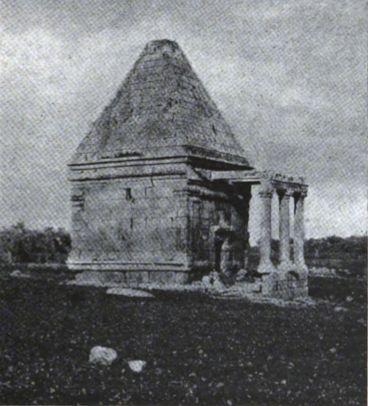
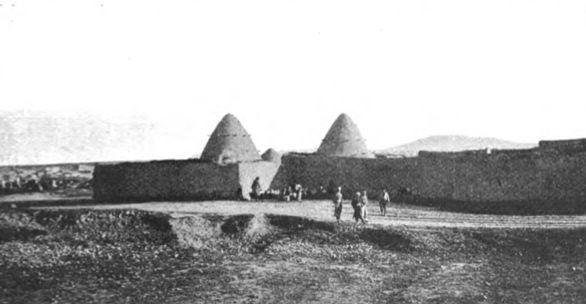
A BEEHIVE VILLAGE
About half an hour to the north of Kefr 'Ābid there is a little beehive village which contains a very perfect mosaic of geometrical patterns. The fragments of other mosaics are to be found scattered through the village, some in the houses, and some in the courtyards, and the whole district needs careful exploration while the new settlers are turning up the ground and before they destroy what they may find. We reached Aleppo at midday, approaching it by an open drain. Whether it
TOMB, DĀNA
were because of the evil smell or because of the heavy sky and dust-laden wind I do not know, but the first impression of Aleppo was disappointing. The name, in its charming Europeanised form, should belong to a more attractive city, and attractive Aleppo certainly is not, for it is set in a barren, treeless, featureless world, the beginning of the great Mesopotamian flats. The site of the town is like a cup and saucer, the houses lie in the saucer and the castle stands on the upturned cup, its minaret visible several hours away while no vestige of the city appears until the last mile of the road. I stayed two days, during which time it rained almost ceaselessly, therefore I do not know Aleppo—an Oriental city will not admit you into the circle of its intimates unless you spend months within its walls, and not even then if you will not take pains to please—but I did not leave without having perceived dimly that there was something to be known. It has been a splendid Arab city; as you walk down the narrow streets you pass minarets and gateways of the finest period of Arab architecture; some of the mosques and baths and khāns (especially those half ruined and closed) are in the same style, and the castle is the best example of twelfth-century Arab workmanship in all Syria, with iron doors of the same period—they are dated,— and beautiful bits of decoration. There must be some native vitality still that corresponds to these signs of past greatness, but the town has fallen on evil days. It has been caught between the jealousies of European concession hunters, and it suffers more than most Syrian towns from the strangling grasp of the Ottoman Government. It is slowly dying for want of an outlet to the sea, and neither the French nor the German railway will supply its need. Hitherto the two companies have been busily engaged in thwarting one another. The original concession to the Rayak-Ḥamāh railway extended to Aleppo and north to Birijik I was told that the tickets to Birijik were printed off when the first rails were laid at Rayak. Then came Germany, with her great scheme of a railway to Baghdad. She secured a concession for a branch line from Killiz to Aleppo, and did what she could to prevent the French from advancing beyond Ḥamāh, on the plea that the French railway would detract from the value of the German concession—my information, it may be well imagined, is not from the Imperial Chancery, but from native sources in Aleppo itself. Since I left, the French have taken up their interrupted work on the Rayak-Ḥamāh line, though it is to be carried forward, I believe, not to Birijik, but only as far as Aleppo.[11] It will be of no benefit to the town. Aleppo merchants do not wish to send their goods a three days' journey to Bey rout; they want a handy seaport of their own, which will enable them to pocket all the profits of the trade, and that port should be Alexandretta. Neither does the Baghdad railway, if it be continued, offer any prospect of advantage. By a branch line already existing (it was built by English and French capitalists, but has recently passed under German control) the railway will touch the sea at Mersina, but Mersina is as far from Aleppo as is Beyrout. That a line should be laid direct from Aleppo to Alexandretta is extremely improbable, since the Sultan
fears above all things to connect the inland caravan routes with the coast, lest the troops of the foreigner, and particularly of England, should find it perilously easy to land from their warships and march up country. Aleppo should be still, as it was in times past, the great distributing centre for the merchandise of the interior, but traffic is throttled by the fatal frequency with which the Government commandeers the baggage camels. Last year, with the Yemen war on hand and the consequent necessity of transporting men and military stores to the coast that they might be shipped to the Red Sea, this grievance had become acute. For over a month trade had been stagnant and goods bound for the coast had lain piled in the bazaar a little more and they would cease to come at all, the camel owners from the East not daring to enter the zone of danger to their beasts. Here, as in all other Turkish towns, I heard the cry of official bankruptcy. The Government had no funds wherewith to undertake the most necessary works, the treasuries were completely empty.
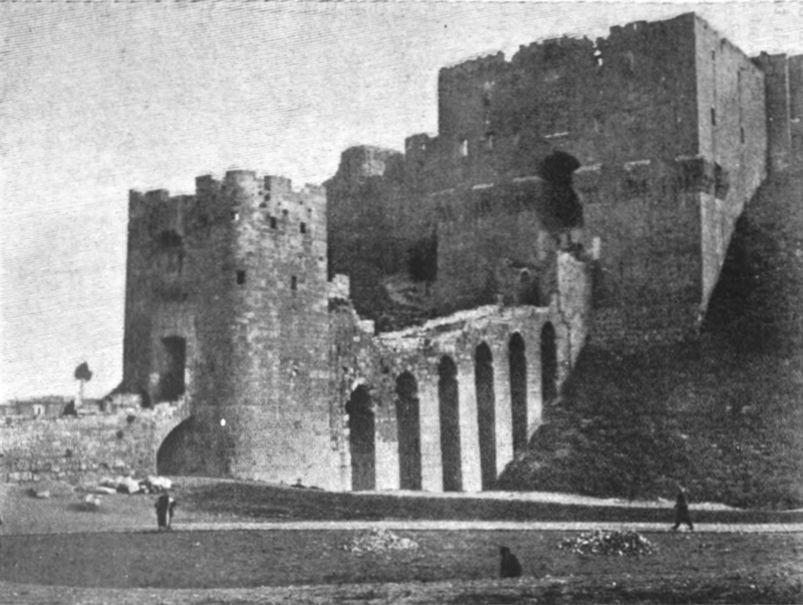
THE CASTLE, ALEPPO
Though my stay was short I was not without acquaintances, among whom the most important was the Vāli. Kiāzim Pasha is a man of very different stamp from the Vāli of Damascus. To the extent that the latter is, according to his lights, a real statesman, in so far is Kiāzim nothing but a farceur. He received me in his harem, for which I was grateful when I saw his wife, who is one of the most beautiful women that it is possible to behold. She is tall and stately, with a small dark head, set on magnificent shoulders, a small straight nose, a pointed chin and brows arching over eyes that are like dark pools—I could not take mine from her face while she sat with us. Both she and her husband are Circassians, a fact that had put me on my guard before the Vāli opened his lips. They both spoke French, and he spoke it very well. He received me in an offhand manner, and his first remark was:
"Je suis le jeune pasha qui a fait la paix entre les églises."
I knew enough of his history to realise that he had been Muteserrif of Jerusalem at a time when the rivalries between the Christian sects had ended in more murders than are customary, and that some kind of uneasy compromise had been reached, whether through his ingenuity or the necessities of the case I had not heard.
"How old do you think I am?" said the pasha.
I replied tactfully that I should give him thirty-five years.
"Thirty-six!" he said triumphantly. "But the consuls listened to me. Mon Dieu! that was a better post than this, though I am Vāli now. Here I have no occasion to hold conferences with the consuls, and a man like me needs the society of educated Europeans."
(Mistrust the second: an Oriental official, who declares that he prefers the company of Europeans.)
"I am very Anglophil," said he.
I expressed the gratitude of my country in suitable terms.
"But what are you doing in Yemen?" he added quickly.
"Excellency," said I, "we English are a maritime people, and there are but two places that concern us in all Arabia."
"I know," he interpolated. "Mecca and Medina."
"No," said I. "Aden and Kweit."
"And you hold them both," he returned angrily yes, I am bound to confess that the tones of his voice were not those of an Anglo-maniac.
